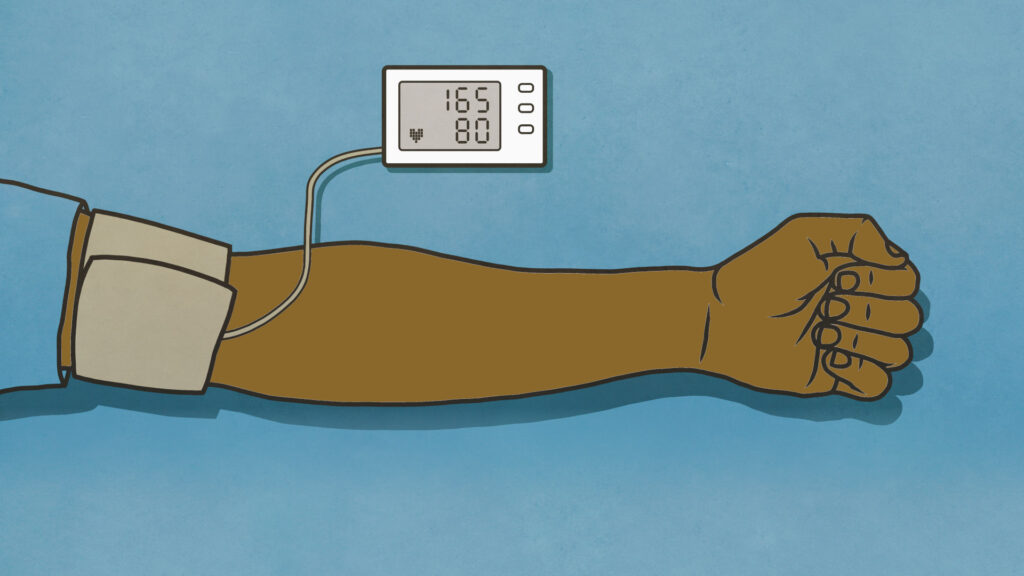This Is Why Your High Blood Pressure Isn't Responding to Medication

THESE ARE THE MOST COMMON CULPRITS OF MEDICATION RESISTANT HYPERTENSION, DOCTORS SAY.
Having high blood pressure, or hypertension, puts you at an elevated risk of heart disease and stroke—two of the leading causes of death in the United States. The Centers for Disease Control and Prevention (CDC) estimates that nearly half of American adults, or roughly 116 million people, are living with the condition, and only one in four of them has it under control. A change in lifestyle habits is often the first line of defense against high blood pressure, but if that doesn't do the trick, medication is usually the next step. Unfortunately, some people who have been diagnosed with hypertension find that nothing seems to bring those numbers down, and an estimated 20 to 30 percent of high blood pressure patients develop what doctors term "resistant hypertension."
The experts at Johns Hopkins Medicine define resistant hypertension as blood pressure that exceeds safe levels even when patients are taking the maximum recommended dose of three different blood pressure medications simultaneously. They say people with resistant hypertension are significantly more likely to suffer from heart attacks, strokes, and kidney failure. What causes this dangerous condition, and what can you do if your blood pressure isn't responding to medication? Read on to find out what researchers say are the most common culprits behind resistant hypertension—and what to do if you're dealing with it.
RELATED: If You Have This Blood Type, Your Heart Disease Risk Is Higher, New Study Says.
Older age and obesity increase your odds of resistant hypertension.
Shutterstock
Unfortunately, one of the major factors that increases the risk of resistant hypertension is out of your control: your age. A scientific statement from the American Heart Association (AHA) says that although there are many different causes behind resistant hypertension, older age is "one of the strongest risk factors" for the condition. Obesity, too, is a common culprit, and the statement goes on to say that "the incidence of resistant hypertension will likely increase as the population becomes more elderly and heavier."
People with chronic kidney disease, diabetes, sleep apnea, and Black people are also at an elevated risk for resistant hypertension, according the the Cleveland Clinic.
Lifestyle factors that can contribute to the development of high blood pressure—and blood pressure that doesn't respond to treatment in particular—include eating a high-sodium diet, lack of exercise, and "heavy alcohol intake."
RELATED: Drinking Too Much of This Popular Beverage Can Ruin Your Heart, Experts Warn.
Some cases of hypertension are what doctors call "pseudo-resistant."
Shutterstock
If your blood pressure readings aren't coming down to acceptable levels even with medication, it's worth considering whether you may have "pseudo-resistant hypertension," which, as the name implies, means your blood pressure numbers aren't what they appear to be. This can happen for a number of reasons, including what's known as "the white coat effect."
Whether the healthcare worker who puts a cuff on your arm actually wears a white coat or not, the Mayo Clinic explains that this happens when people's blood pressure measures higher in a doctor's office than it otherwise would.
If white coat syndrome is suspected, your doctor may ask you to take your blood pressure at home, or wear a portable monitor to track your blood pressure for up to 24 hours as you go about your normal routine. Pseudo-resistance can also be caused by improper measuring technique, stiff arteries that prevent the blood pressure cuff from doing its job, taking medication incorrectly, or taking supplements or other medications that interfere with your blood pressure medicine, says Johns Hopkins Medicine.
High blood pressure may not have any symptoms—until it's too late.
iStock
High blood pressure is nothing to mess around with. Because it often has no symptoms at all, the Cleveland Clinic explains, it's called the "silent killer." Many people don't realize they have high blood pressure until they have a heart attack or stroke. Headaches, a pounding chest, dizziness, and shortness of breath are all signals of a possible hypertensive crisis that calls for immediate medical attention.
If you're in the habit of monitoring your blood pressure at home, take a look at the AHA's guidelines for healthy blood pressure. If you get a systolic reading (that's the upper number) higher than 180, or a diastolic number (the lower number) higher than 120, contact your doctor right away.
RELATED: For more health advice delivered straight to your inbox, sign up for our daily newsletter.
Lifestyle changes could make a difference.
iStock
Whether your high blood pressure is responsive to medication or not, there several things you can do to help keep your heart healthy—and your blood pressure under control. The Mayo Clinic says studies have shown that the DASH diet (that stands for Dietary Approaches to Stop Hypertension) can lower blood pressure in as little as two weeks. It's a low-sodium diet that includes plenty of vegetables, fruits, and whole grains, and limits saturated fats such as full-fat dairy and certain meats.
Exercise, too, is beneficial in controlling blood pressure—and it may not take as much as you think. Just 30 minutes a day of moderate aerobic activity five days a week, the amount recommended by the AHA, may be enough to do the trick.
If you're stressed—and who isn't these days?—try mindfulness-based exercises like yoga and meditation. A 2019 study published in the journal PLOS One found that mindfulness exercises can be effective in improving blood pressure, and that the best results were seen in people with more advanced and uncontrolled hypertension.
RELATED: Eating This 4 Times a Week Slashes Heart Attack Death Risk, Study Says.